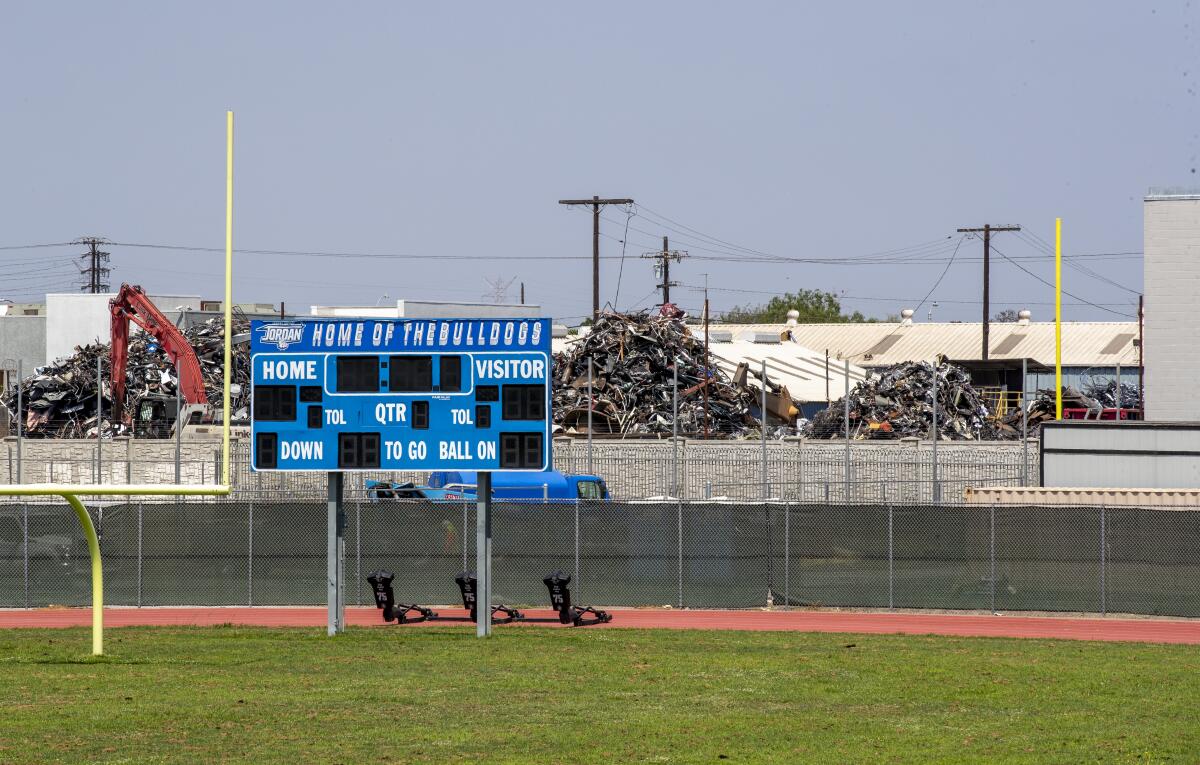LAUSD says recycler is endangering Jordan High students with ‘sharp metal projectiles’

The Los Angeles Unified School District filed suit against a metal recycling facility adjacent to Jordan High School in Watts, alleging it has endangered students and teachers by releasing sharp pieces of metal, smoke, fumes and other hazards onto school grounds.
The lawsuit, filed Monday in the U.S. District Court for the Central District of California, seeks a court order to stop S&W Atlas Iron & Metal Co. from “continuing to allow dangerous, sharp metal projectiles,fine metallic dust and other objects to be launched or emitted from their property onto the adjacent LAUSD school.”
The district also alleges the metallic dust released by the facility is composed of lead, arsenic and other hazards and leaves a “purple shimmer” on the blacktop.
Through its attorney, the company said the suit had no legitimate basis and that the recycling facility enjoyed broad community support.
The school district, however, hopes to apply the legal and political pressure necessary to force the plant to relocate or shut down, calling it an unsuitable neighbor for a school as well as for the $1-billion makeover of the adjacent Jordan Downs public housing development.
“This high-risk facility must be relocated away from the sensitive school population and the new residents who will soon populate the new Jordan Downs project,” the district wrote to L.A. City officials in a letter signed by school board President Richard Vladovic.
Although the company was not yet prepared to respond to every new allegation, “similar issues were raised previously and they continue to be without merit,” said attorney William W. Funderburk, Jr. of Castellón & Funderburk, which is representing Atlas.
An Atlas defender said the business had played a positive role in the community and tried to operate responsibly.
“They supported us when we needed anything,” said Sweet Alice Harris, a well-known community civil rights activist. “They have always worked with us. They’ve always worked with Jordan High School.”
Harris said that over the years the company’s owners had donated money for the school’s basketball and football uniforms. She also praised the company for providing jobs within the economically stressed Watts neighborhood and providing needed cash to local residents who dropped off scrap metal.
The district’s lawsuit accuses the three-acre facility of recently intensifying its operations, amassing giant metal piles of dismantled vehicles, junk and debris that tower over a wall separating its operations from the school. The district cites incidents in February and March in which sharp pieces of metal flew from the facility onto the school property, one landing within five feet of an LAUSD construction worker and another next to the school’s gymnasium.
The suit alleges that, on June 9, a worker at the Atlas facility was burning “a plastic wiring object” with a torch and released noxious fumes and smoke that engulfed part of the school for hours, nauseating construction workers.
The suit, filed under the Comprehensive Environmental Response, Compensation and Liability Act — the federal Superfund law — also seeks to hold the company liable for district costs of responding to, monitoring, investigating and cleaning the school site, as well as for attorneys’ fees and other damages. It estimates those costs to be more than $1 million.
In addition to the company, the suit also names Gary Weisenberg and Matthew Weisenberg as defendants, identifying them as owners of the recycling facility at 10019 S. Alameda St.
School district leaders, in their letter to the city, called the situation an “environmental injustice” and blamed the Los Angeles City Council for allegedly failing to address the hazards of the metal-recycling operation and even easing health and safety restrictions over the objections of the city planning department.
The letter also refers to the city’s concurrent redevelopment of the adjacent Jordan Downs.
“It is absolutely stupefying that a one-billion-dollar residential development project, designed to improve the quality of life for an underserved community in South Los Angeles, does not reflect the environmental justice values frequently advanced and advocated by government officials,” the letter said.
The Los Angeles City Attorney’s Office said Tuesday that it has opened an investigation into “environmental concerns” related to Atlas. This inquiry is in response to contact over the last several weeks with the school district, said Rob Wilcox, a spokesman for City Attorney Mike Feuer.
The area is represented on the City Council by Joe Buscaino. “The councilman is in favor of rectifying any problems the school district has with this business,” said Branimir Kvartuc, Buscaino’s communications director.
A spokeswoman for Mayor Eric Garcetti said his office was reviewing the letter.
The Jordan campus is shared by a district-run high school and a charter school, with a combined capacity of about 3,700 students, though the campus has been closed since March 13 due to the COVID-19 pandemic.
The campus and neighboring housing development are located in a predominantly Black and Latino neighborhood of South Los Angeles with some of the city’s highest poverty levels. State environmental agencies ranked the area in the top 5% Census tracts most burdened by multiple pollution sources statewide, based on the amount of contaminated sites, toxic emissions, hazardous waste facilities and other health threats.
The facility has operated as a metal recycling and salvage yard since the 1940s and has a history of environmental problems, according to the lawsuit. They include a May 2002 explosion, which occurred when an oil drum was being cut and sent metal shards onto school grounds. In another incident that year, a chunk of metal from a military shell was propelled over a fence onto the athletic field. Those incidents prompted an investigation and subsequent cleanup of contaminated soil overseen by the state Department of Toxic Substances Control.
Another incident cited in the lawsuit occurred two years ago when a metal projectile landed on the playing fields during a physical education class.
Camille Sosa, a physical education teacher at Jordan since 2011, said in a sworn declaration attached to the lawsuit that when one of her students showed her the 6-inch-long piece of metal, “I immediately stopped the class and instructed the students to go indoors in order to protect them from being hit by a metal projectile from the Atlas Site.”
The suit, in addition to alleging chemical emissions, says students are exposed to “extreme screeching and high-pitched noises and vibrations caused by the constantly moving and grinding of the tall piles of recycled metals,” throughout the day, which “greatly disrupts the activities of students and teachers” in their classrooms and playing fields.
Moreover, “several times a week, there are incredibly loud explosions that sound like bombs,” according to a declaration from Sosa.
Recent tests of the school’s roof and HVAC system completed by environmental consultants for the school district found “the School is being dramatically impacted by emissions of metallic dusts consisting of lead, arsenic, zinc and other hazardous metals emanating from the Atlas Site,” according to the lawsuit.
Jordan High Principal Lucia Cerda said in a sworn declaration attached to the lawsuit that when she started working there as a teacher 12 years ago, “I was immediately struck by the deafening noises and vibrations caused by the crushing metals at the Atlas site and by the tall piles of metals that towered over the wall separating the School from the Atlas Site.”
“The constant loud noises combined with the shocking eye sore of the gigantic metal piles presented a challenging learning environment,” Cerda’s declaration said.
Since Cerda became principal in January 2019, the declaration said, she had become increasingly concerned that the giant metal piles would topple onto the campus as well as result in long-term health problems for students, teachers and staff.
In response to the allegations, Funderburk provided court documents from separate litigation, in which company representatives insist they have taken responsibility for past issues and don’t deserve the blame for others. The incident with the military shell, for example, occurred when ordnance that had been certified as inert turned out not to be.
In a larger sense, Funderburk said, the company is being unfairly and incorrectly blamed for pollution problems in an area that has seen much more hazardous industrial activity.
More to Read
Sign up for Essential California
The most important California stories and recommendations in your inbox every morning.
You may occasionally receive promotional content from the Los Angeles Times.












